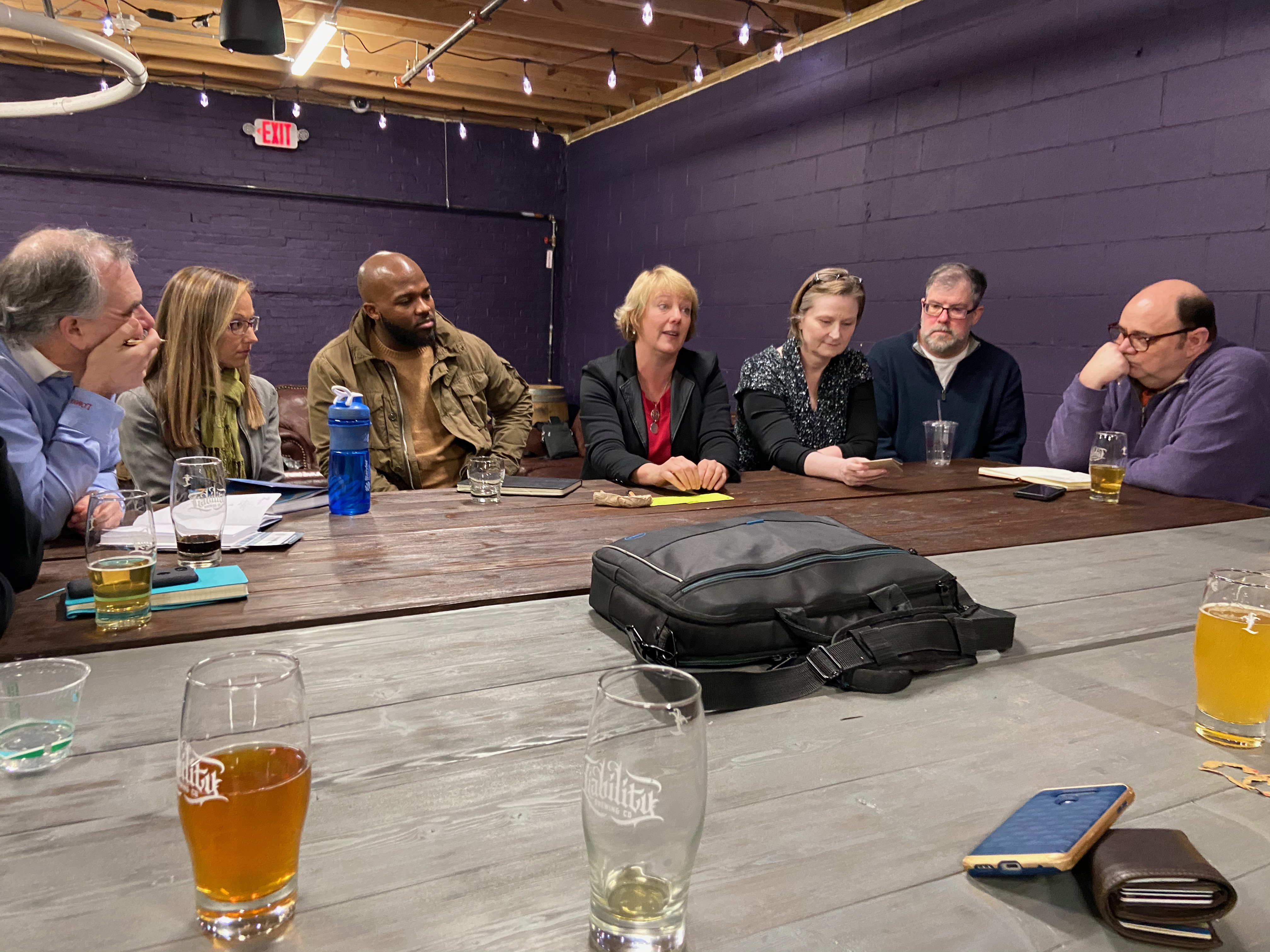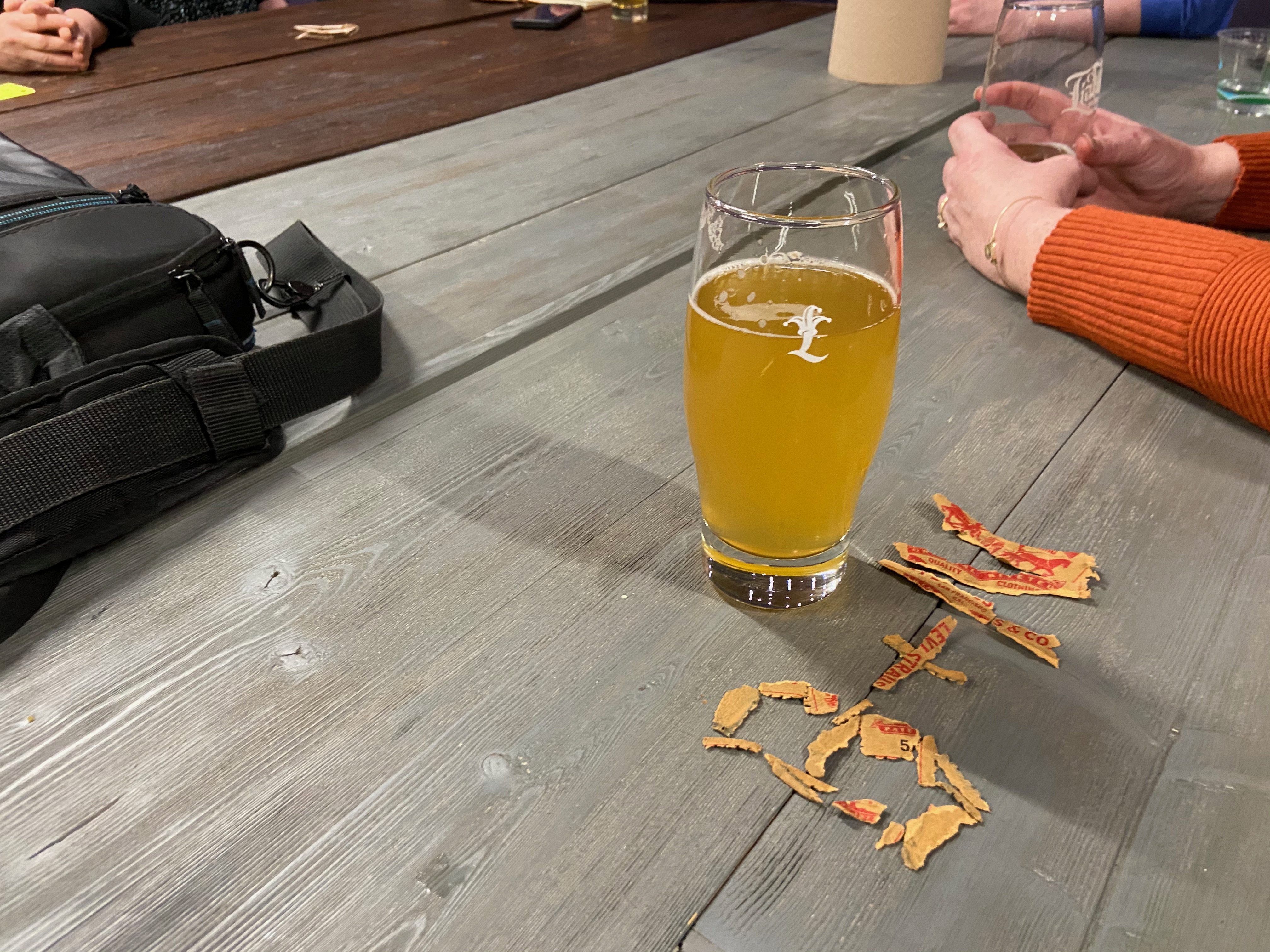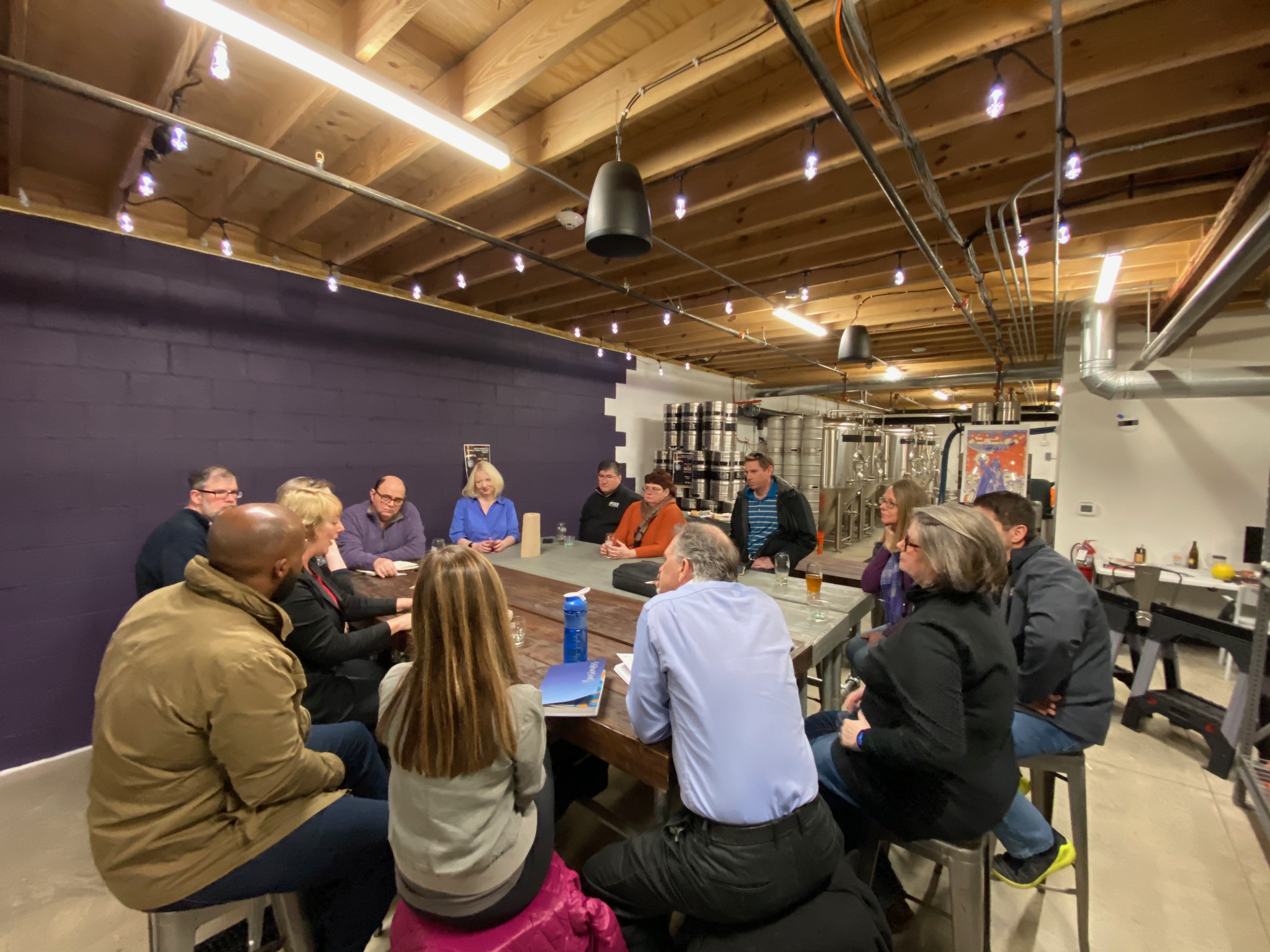On January 22, Lisa Marie Corley and Teddi Fishman visited Beer and Napkins at the Liability Tap Room in Greenville, to share some activities based on improv comedy. The theme of the evening was “navigating and embracing chaos,” chosen to align with the VUCA Sessions framework. In this post, Teddi answers a series of questions about the purpose and value of those activities:
Q: Embrace chaos? We came to talk and drink beer! Why purposefully take us out of our comfort zones?
A: While there are lots of specific reasons—ranging from simply breaking the ice in social settings to interrupting and resetting dysfunctional workplace communication patterns–the “meta” purpose of exercises like these is to take our brains off of auto-pilot and “goose” them into thinking thoughts and making choices they wouldn’t normally entertain.

Q: Goosing brains? Seems like that would be uncomfortable–and possibly an HR violation. Why would people want to do that?
A: Think about your commute to work. You’ve done it hundreds of times, so you don’t have to think much about the choices along the way. Turn here. Exit there. Same route, same highway, but very little thought or even perception.
Now imagine that one day, a tree falls across the road, and you can’t get onto the highway. Imagine your phone can’t tell you what to do. All of a sudden, you’re in uncharted territory, where each intersection is a choice. You see—maybe for the first time—what has been around you, just out of sight, all along. Even more importantly, you’re engaged. You have to make decisions, and each one is new. Every choice is an active choice. It’s an exercise for your brain. It has to do new work to get you where you want to go. New discoveries can be made.
Q. So now our brains have been goosed, and you’ve made them work out. How does that prepare us for a world full of volatility, uncertainty, complexity, and ambiguity? My brain is tired and just wants to collapse on the couch!
A: Our brains DO want to sit on the couch. They conserve energy constantly by falling into habits and patterns that, for the most part, serve us when the status quo is what we want. But when things are volatile, uncertain, complex ambiguous, or when the status quo just isn’t working as desired, the tendency to follow habits and patterns makes it harder to adapt and change. Going back to the road example—if you go the way you’ve always gone, you’re going to keep getting to the same place. Sometimes a tree in the road is exactly what you need.
Q: OK, it makes sense that we would keep doing what we do until there is a reason to do something differently, but why improv? Isn’t that just for nerds and the poorly adjusted?
A: Wait. What? No! Or, maybe! But the serious answer to this question is twofold—one practical reason and one more conceptual. The practical reason is that when we put ourselves in situations where we have to make quick decisions that are bounded by constraints, our brains go into overdrive, and grab whatever they can—even the unfamiliar. The activities force participants to be fully present in the moment because there is no planning ahead—you don’t know what will be coming next. That works different “brain muscles” than the ones we typically use. Our usual filters—filters we don’t even necessarily know we have—don’t have time to engage. Without time to ask ourselves “will this sound smart?” or “is this what will make my boss think I’m ready for a promotion?” we generate responses and ideas that can surprise and delight. More importantly, though, having gone down an unfamiliar path opens up future possibilities for exploration.
Conceptually, improv is based on a set of principles that drive and facilitate not only creativity but also positive communication patterns. The foundation of improv is “yes, and.” That means that when you are presented with an offer—an idea—you bypass skepticism and other defensive “walls.” Your job, instead, is to take the offer and build upon it. For the purpose of the exercise, whatever has been said is valid and your role is to make it better. The exercise we did in which we built a word-at-a-time sentence is that in its simplest form. Each participant accepts the words that have come before, then adds something, in hopes of contributing to a sentence that will eventually succeed. No one person can control it; the group has collective responsibility for the outcome. It sounds simple, but consider the difference between that and your most recent office meeting. Did it seem like folks were inclined to accept or at least entertain the contributions of others, and then build on it toward collaborative greatness? A little yes-and-ing can go a long way!

Q: So you goosed us, worked us out, got our brains off their couches, and made them “yes, and.” With friends, and with beer, it went fine, but even there, there were some tense moments. Surely it doesn’t always work. What if people fail?
One of the best things about improv is its resilience. While it’s true that not everything succeeds, it’s also almost impossible to ruin it. (Trust me. I’ve tried.) When it goes well, it goes well and it’s great. When it doesn’t—well, sometimes that can be even funnier. But even when it doesn’t go well, and it isn’t funny, you can step back, see what can be learned, and nothing breaks. You can try again. In fact, some of the very best lessons are those that come from failure—which is a lesson in and of itself. There’s pretty much no safer space in which to fail than in a friendly, non-theatrical improv game. The rules of each game are the “tree in the road” that is the catalyst to thinking differently.
Q. OK, I guess I’ll consent to a bit of goosing if it helps me prepare for success in a VUCA world. But how do I take what we did at Beer and Napkins and translate it into what I do in other settings?
A. Well, that answer largely depends on what you do with it. Like any other practice, changing the way you think takes . . . practice. The more you habituate your brain to thinking differently, the more it will change, and also, the more comfortable changing will become. The kinds of change people generally want most, however, take more than a few exercises, and more than one brain. What we did were the first steps—steps to help people get out of their comfortable patterns and feel safe to take the initial plunge. The amount of change you want to effect will determine what kind and how much additional work you’ll need to do. Just want a little brain reboot? Play a game or two! Want to revitalize your working group? Maybe take an afternoon workshop. Need to turn around a whole workplace culture? That’s a sustained effort, but it can be done.
Q. Wait. Are you saying that a few improv games can turn around a whole culture?
A. Not by themselves. Any workplace culture that can be “fixed” by a few games is a culture that’s pretty healthy to start with, but improv games are not the only thing we have in our bag of tricks. Large-scale cultural change takes a more comprehensive approach that starts with identifying goals and values, looking at systems, processes, and incentives, and helps develop leaders from within the culture to guide and manage positive change—a bit much for a night at Liability Brewing. We had just enough time for a brief introduction, but in the short amount of time we spent together, participants allowed themselves to be vulnerable, tried some (slightly scary) unfamiliar activities and explored some new ways of thinking. We saw creativity, collaborative thinking, collegiality and yes, a little chaos—and still lived to tell the tale! It was a good start and also a reminder that living in a VUCA world can be fun.
Note from Lisa and Teddi: Thank you for inviting us, for taking chances, and letting us be your tree.
You can reach Teddi and Lisa on their LinkedIn pages.



 verse group of Thinkers and Doers Wanted!
verse group of Thinkers and Doers Wanted!